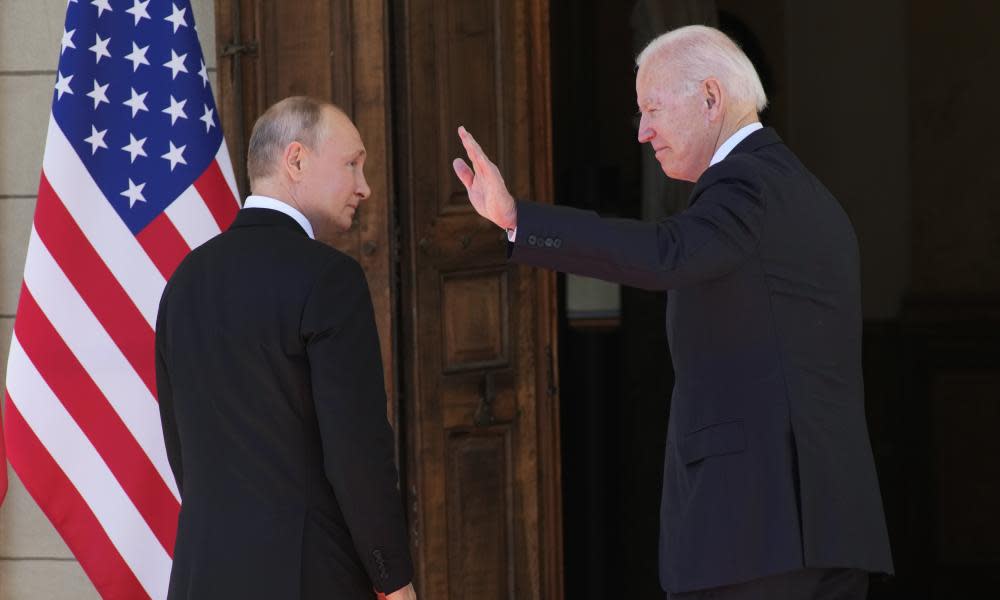Biden to speak with Putin amid Russia’s increased presence near Ukraine

- Oops!Something went wrong.Please try again later.
- Oops!Something went wrong.Please try again later.
Joe Biden will speak on Thursday with Vladimir Putin regarding the Russian president increased security demands in eastern Europe.
The two leaders will discuss a range of topics, including “upcoming diplomatic engagements in Russia”, said US national security council spokesperson Emily Horne in a statement announcing the call.
Thursday’s talks come at the request of Russia amid Russia’s increased security presence near Ukraine as the US and its allies watch on warily. The buildup of Russian troops near the Ukrainian border has grown to an estimated 100,000 and has fueled fears that Moscow is preparing to invade Ukraine.
Moscow has also announced it would hold new joint military drills with Belarus in February or March.
“This dialogue should, and we expect will, proceed on the basis of reciprocity. There will be topics where we can make meaningful progress and topics where we will have differences. That’s the nature of diplomacy,” said a senior Biden administration official in a background press call.
The Kremlin has said that Putin wants to speak with Biden as part of the preparations for a formal round of security talks set to begin between US and Russian delegations in Geneva next month.
Asked why the Kremlin had requested an additional phone call with Biden, Putin’s press secretary Dmitry Peskov said: “This is because of the substance, the items on the agenda are extremely complicated.”
Russia has demanded that Nato pledge not to admit Ukraine into the military alliance and that it remove its troops and military infrastructure from countries that joined after 1997. The United States has said it will not discuss issues that affect its allies’ security without their direct participation and has sought to assuage their concerns ahead of the call.
On Wednesday, the US secretary of state, Antony Blinken, spoke with the Ukrainian president, Volodymyr Zelenskiy.
According to state department spokesman Ned Price, Blinken “reiterated the United States’ unwavering support for Ukraine’s independence, sovereignty and territorial integrity in the face of Russia’s military buildup on Ukraine’s borders”.
“We have had very good discussions with the Ukrainian side in terms of short-term confidence-building measures that they have put on the table with the Russian side… We have seen a real willingness on the part of the Ukrainian side to put forward proposals aimed at confidence building de-escalation,” the senior official said.
The talks between Biden and Putin will begin late on Thursday evening in Moscow and are expected to be conducted in private.
In a New Year’s greeting published by the Kremlin ahead of the call, Putin said: “I am confident that, following up on our agreements reached during the June summit in Geneva and subsequent meetings, we can move forward and establish an effective Russian-American dialogue based on mutual respect and consideration for each other’s national interests.”
Earlier this month, Biden and Putin held a virtual summit regarding the Ukraine crisis but made little apparent headway.
“The discussion between President Biden and President Putin was direct and straightforward. There was a lot of give and take, there was no finger-wagging. But the president was crystal clear about where the United Stated stands on all these issues,” said the US national security adviser, Jake Sullivan.
During those talks, Putin demanded “reliable, legal guarantees” that would prevent Nato’s expansion towards Russia or place missile systems in Russia’s bordering countries.
Shortly after the talks, Russia put forward a list of highly contentious security guarantees it says it wants the west to agree to in order to reduce tensions in Europe and defuse the crisis over Ukraine.
The demands include a ban on Ukraine from entering Nato and limiting troop deployment and weapons to Nato’s eastern flank. Russia has also asked Nato to not hold drills without previous agreement from Russia in Ukraine, eastern Europe, in Caucasus countries or in central Asia.
Peskov said the two leaders are expected to continue discussions that began at the video summit and that they would also discuss upcoming talks between Russia and the US, Nato, and the Organisation for Security and Cooperation in Europe set to begin in mid-January.
Moscow has said that ignoring its interests will result in a “military response” similar to the Cuban missile crisis in 1962.
Putin announced this week that he will hold new joint military drills with Belarus, which also borders Ukraine. The drills are scheduled for February or March, Putin said after meeting with Belarus’s Alexander Lukashenko. He did not say how many troops would take part in the drills or what their objective would be.
On Sunday, Putin said he would consider a slew of options if the west fails to meet his push for security guarantees precluding Nato’s expansion to Ukraine.
In Wednesday’s statement, Horne said: “President Biden has spoken with leaders across Europe, and Biden administration officials have engaged multilaterally with Nato, the EU and the OSCE [Organization for Security and Cooperation in Europe].
“The Biden administration continues to engage in extensive diplomacy with our European allies and partners, consulting and coordinating on a common approach in response to Russia’s military build-up on the border with Ukraine.”
The senior official said that the US is “also prepared to respond if Russia advances with a further invasion of Ukraine”.
“We have made plans to reinforce Nato’s force posture in allied states in the event of a further invasion, and we are prepared to provide Ukraine with further assistance to defend its territory,” he added.
Nevertheless, he reiterated that Biden will emphasize to Putin that “there is a clear diplomacy path to de-escalating tensions in the region if President Putin is interested in taking it”.

